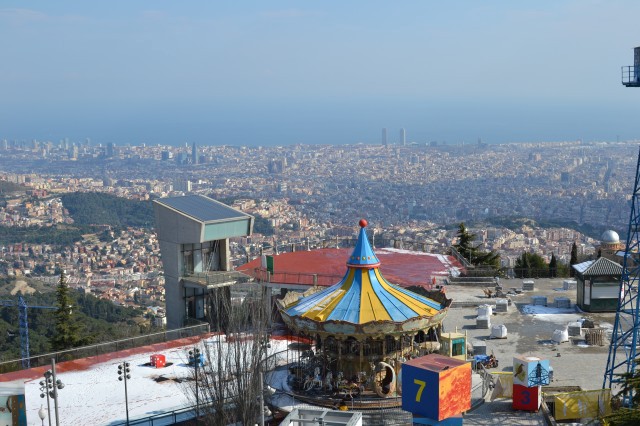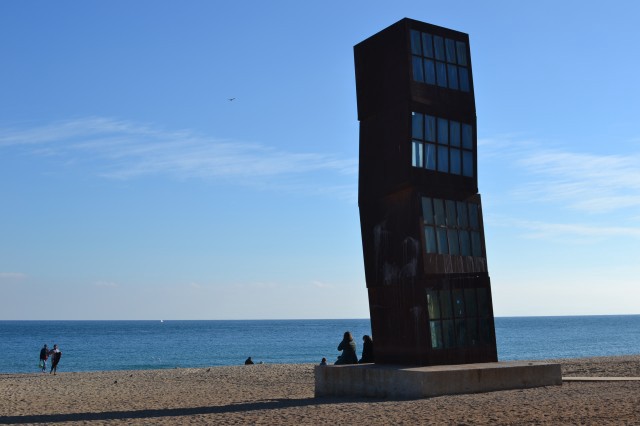On Living Abroad
by Molly Niendorf

Living in a foreign country doesn’t mean leaving life as you know it completely behind. Before I moved to Barcelona, though, I thought that’s what a “true adventure” was. Because that’s often the narrative that’s splashed around travel sites and blogs (and it’s a supremely tempting narrative): Ditch your life as a corporate drone! Stop consuming like an over-indulged American! Spend your days sun-bathing on the beaches of [insert-tropical-location-here]!
Of course, there are kernels of truth to these narratives. Stepping off the plane does give you a sense of infinite possibility. No one knows who you were before. You can start fresh, if a fresh start is what you need — and who doesn’t like the sheen of a new beginning? You can take risks; in fact, you’re encouraged to take risks, ones that might even be frowned upon at home.
All that aside, I’ve realized that the leave-everything-behind mold doesn’t work for me — and I think it’s one of the reasons some people find the prospect of moving abroad daunting. But instead of being a no-holds-barred 180, long-term travel can also be what you want it to be, on your terms, free of other people’s expectations (and your own) — and it can still be wildly liberating and challenging.
Let me back up and give some context to this. A year ago, I found myself longing for big change. I’d been in a job for four years that didn’t feel like a fit anymore, although I loved my coworkers (and steady paycheck!), and I was going through big heartbreak in a relationship. For someone like me who’s fiercely loyal and thinks the right amount of love and elbow grease should solve any problem, walking away from a job (especially if it’s fairly good) and a man (even if he’s bad) is akin to, well, what? Slamming a finger in a car door? Getting walloped in the jaw? Maybe, but it’s more. It’s quitting, admitting defeat. It’s heart-wrenching, maybe even a little shameful, and it requires admitting that the course you were so sure about years earlier might not be in service to your well being any longer.
As all of this stuck-in-mud-get-me-out-of-this-mud-but-I’ve-grown-to-love-this-mud stuff was transpiring, I was also dealing with a competing desire. Ever since I studied abroad in Seville, Spain, nearly 10 years ago, I’ve said that I want to live in a foreign country again. To drop myself in a new culture with a different language and a different way of life for more than three weeks at a time. While travel has always been a priority to me — I’ve traveled abroad once or twice per year for the last five years — each trip felt like a vacation, like a tiny thimble-ful of an experience. I wanted to drink a full cup, a barrel. I wanted to get intoxicated.
In hindsight, everything came together at the right time for me to realize my travel dreams: unfulfilling job, busted relationship. Upcoming end to the lease terms on my apartment. No pets, no children, no major commitments. Blessings in disguise, although at the time I saw them as confirmations that I’d not landed the trappings of an “adult” life.
But I could have stayed in Portland, Oregon, where I was living then. I love Portland. I love its food carts, breweries, and green spaces. I love its inclusive culture and off-kilter humor. It’s the only city where I’ve ever felt truly at home. I have friends there. I have a cobbled-together community.
It would have been easy to stay. I thought about finding a little house with a yard big enough to start a vegetable garden. I thought about applying to new jobs. I thought about dating again.
And then I thought about taking a leap. Screw adulthood. What about a little bit of recklessness?

I decided on Barcelona because it fulfilled so much of what my decade-long travel dreams hinged on: Spanish speakers, proximity to the sea, art and street culture, large enough that I’d never see it all, small enough that I wouldn’t be swallowed up.
I thought about drinking wine in sidewalk cafes and spending sunny days on the beach. I dreamed of speaking Spanish without laboriously translating the language in my head and returning to the states bilingual. I planned side trips to towns along Costa Brava and thought about returning to Seville.
But, more than anything, I wanted to test myself. I wanted to prove that I could strip away so many of the labels that had come to define me — pragmatist, perfectionist, planner — and find happiness in the midst of uncertainty and loneliness.
Well, this all sounds rosy and inspired, if not a little desperate. So what’s the problem?
As I’ve been living in Barcelona for the last six months — and reaching out to expats and reading travel blogs — I’ve noticed an unsettling trend in the community of travelers. The best way to describe it? People are judgey, man. There are all kinds of ideas about what’s a “true adventure,” what makes you a “courageous traveler.” Have you been abroad for more than three years? You qualify as courageous. Just stopping through for a few months? You don’t know what you’re missing. Not going out every weekend? Haven’t been to museum X or restaurant Y? You’re not experiencing the right stuff.
I’ll admit that I bought into a lot of this when I first arrived in Spain. I tried to be authentic to the lifestyle here, which of course can be good, but can also be dangerous. It’s almost as if I tried to renounce the me I was in Portland. I stopped running. I stayed up too late. I drank too much. I ate meat (when I’m largely a vegetarian at home — and prefer it). I put pressure on myself to want to live here long term because it didn’t seem like people would accept that I might prefer my lifestyle in the states.
I fought to do a 180 — that’s what I was here for, wasn’t it? — but now I’m realizing a 180 isn’t for me. And it doesn’t have to be.
I believe one of the reasons people don’t leave the comforts of home is this insidious belief that you must change everything in order to make it valuable.
Simply not true. You can set out to live in a country you’ve always dreamed of. You can learn things and test yourself and have a hell of a good time. You can drink cava in the middle of a Tuesday afternoon, hop on a train and get off on an unplanned stop, dance drunk, dance sober, kiss strangers. And you can hold onto what makes you love your city at home. You can prefer waking to an alarm and riding your bike to work, eating vegan food, and having co-workers. Being surrounded by friends and having a backyard. And you can go back.
You can go back!

Say it a few times to yourself. Keep saying it until it feels good and right and refreshing. If you believe it, it might make your time in your new country even sweeter. All of a sudden that Gothic church you pass on the way to your favorite cafe every morning is a building to remember and cherish, not one to grow used to. That delicious plate of grilled calamari with olive oil, bread, and tomatoes might be one of your last.
You begin to look closer at the people around you: Remember that face, be grateful for that moment of kindness. The experience becomes less about you — do you fit in here? can you make a life here? — and more about the wonder of how others build their lives here.
So, yes, I’m planning to return to Portland in July, and that makes my experience abroad exactly nine months long — or short, depending on how you look at it. Rather than quantifying the experience in days or months or “right” experiences, I’m measuring it more realistically these days. I’m asking myself a question that one of my friends from Portland poses to me on a regular basis: How does your soul feel? The answer to that has nothing to do with geography, of course, and that’s why it’s wonderful.
I will leave here with some disappointments. My Spanish level is still rubbish. I would have liked to have a better work experience here (not having a visa mightily limited opportunities). I never made it back to Seville.
But I’ll carry home a collection of moments and a new set of friends to come visit me in Portland. I’ve changed in personal ways that make me see life paths and responsibilities and markers of success differently. I can sit in silence without planning the next to-do list.
I want my fellow wanderlust seekers to remember this: If you’ve always wanted to live abroad but have faltered because you felt like the change was too big, that it would disrupt your life too much, or that it wouldn’t be worth it unless you stay for years, maybe forever, I urge you to disengage from those narratives. They’re holding your back. They’re placing one expectation on top of another, until you can’t see what the trip is really about.
It’s surely not about the number of days or the number of must-see locations you’re able to tick off in your guidebook. It’s not about denying who you are or proving to other expats that your plans are legit enough. It’s not about a 180.
Make it whatever you want it to be. Make it yours, let it change you, yes, but also let it remind you who you are. And make it good for your soul.
Molly Niendorf is a content strategist and writer currently based in Barcelona, where she’s eating her way through the city one chocolate croissant at a time. She writes about travel and running at seemollyrunaway.com. Say hi to her on Twitter @mollyn.